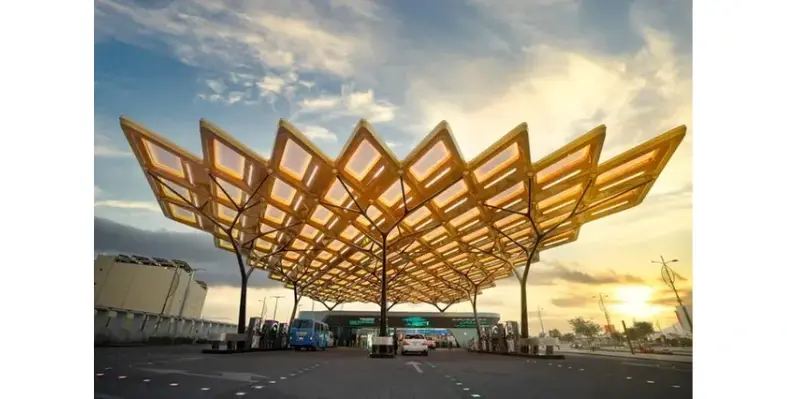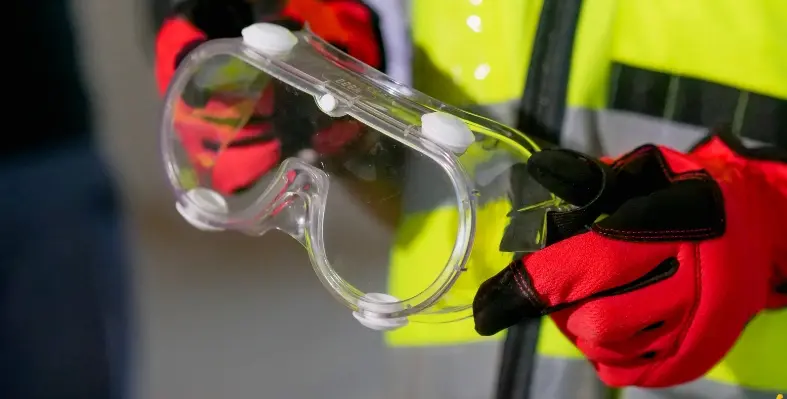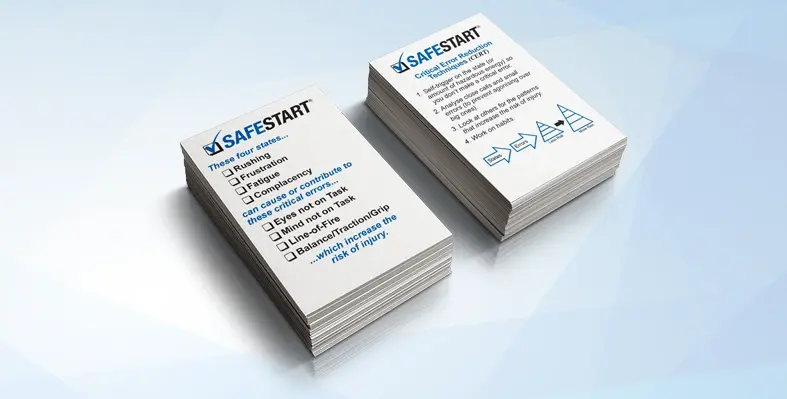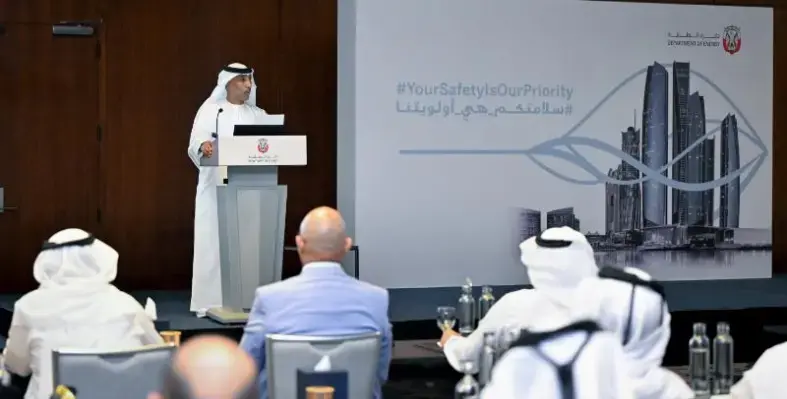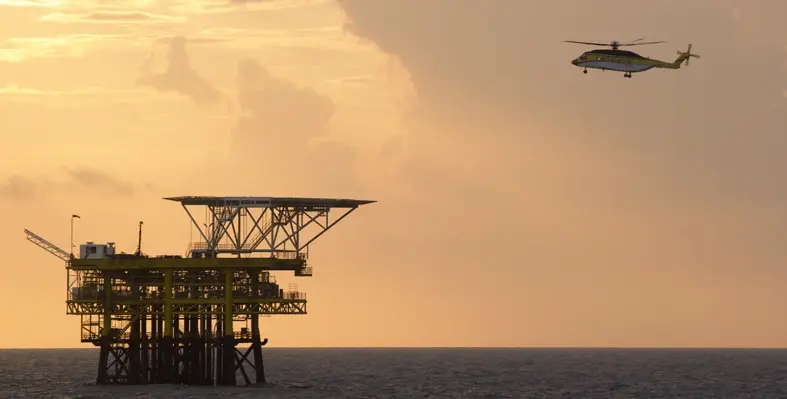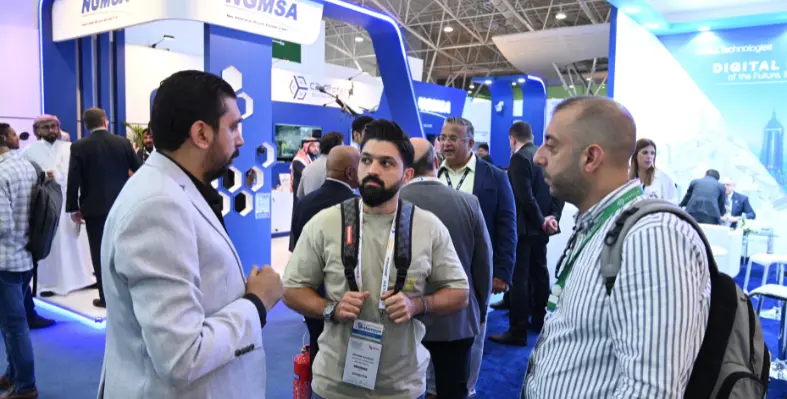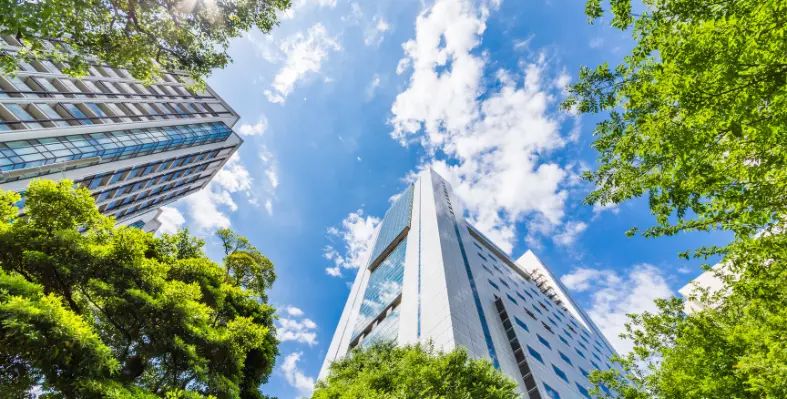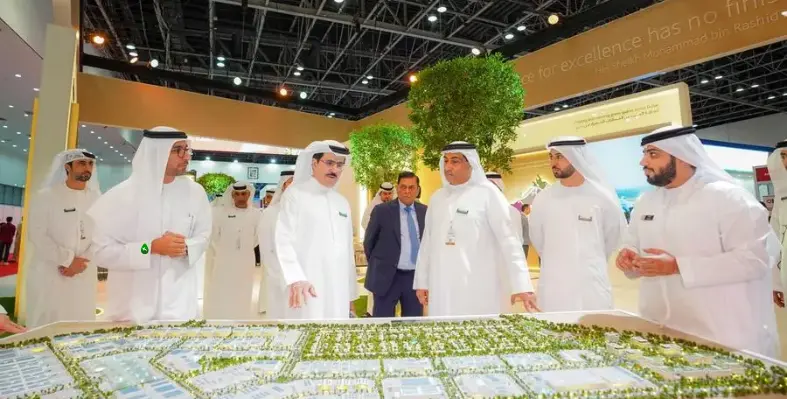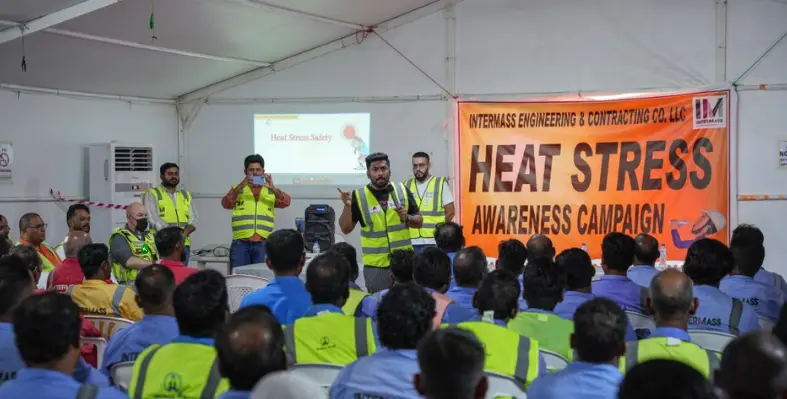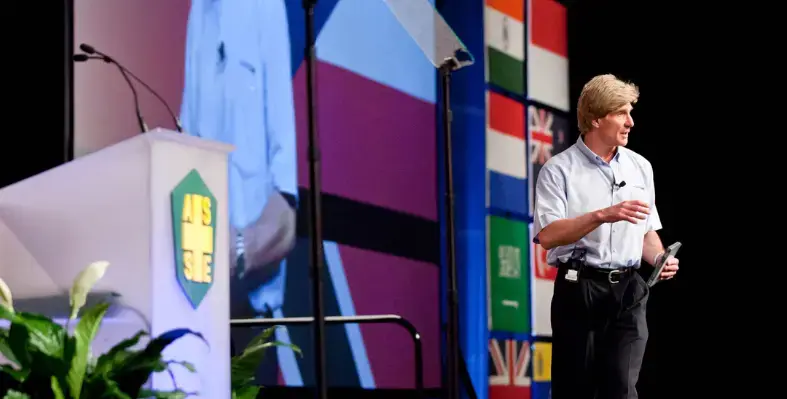HSE
HSE
- Details
- Sania Aziz
- HSE
- Topic: HSE
- Date: 18 September, 2024
- Year: 2024
ENOC Group has won the World of Safety and Health Asia (WSHAsia) Award 2024 in the Environmental Sustainability category for its Service Station of the Future, located at the Dubai Expo 2020 site.
The award highlights ENOC's efforts to integrate sustainability into its operations through innovation.
The Service Station of the Future employs biomimicry, drawing inspiration from natural processes to design materials and structures. It is the first service station globally to achieve LEED Platinum certification, meeting high standards in energy efficiency, water conservation, and CO2 reduction.
The WSHAsia Award acknowledges companies contributing to environmental sustainability within the Occupational Safety and Health industry, focusing on innovative products or services that tackle current and future environmental challenges.
His Excellency Saif Humaid Al Falasi, Group CEO at ENOC, said, “Sustainability has always been a core brand mission for us at ENOC. Our multi-award-winning Service Station of the Future at the Expo 2020 site serves as a symbol of our aspirations to further drive innovation to meet the requirements of the future. World of Safety and Health Asia (WSHAsia) Award underscores our commitment to lead the way in energy savings and water efficiency in alignment with UAE’s Energy Strategy 2050.”
The Service Station of the Future uses solar, wind, and traditional hydrocarbon energy. It is equipped with 283 solar panels generating 140MWh of solar power annually and a 25m wind turbine producing 12.7MWh of wind energy each year. Since its launch, the station has been recognised for its innovative design and sustainability features.
ENOC’s continued focus on sustainability aligns with the UAE’s goal of transitioning to cleaner energy sources and contributes to the country's economic growth and diversification.
- Details
- Sania Aziz
- HSE
- Topic: HSE
- Date: 16 September, 2024
- Year: 2024
ENOC Group wrapped up its 2024 Summer Safety Campaign, aimed at providing retail employees with the knowledge and tools needed to safely navigate the summer season.
The Group conducted a workshop on electrolyte drinks, with the aim of raising awareness among employees about the importance of hydration and getting enough water during the summer.
The campaign also comprised the distribution of over 9,000 essential summer supplies across its three company-owned accommodations. These supplies included, water bottles, fruits, cooling bags, vitamin water, ice cream and mini sunblock.
The campaign concluded with a recognition of key partners, including Sharjah Police, Medcare Royal Speciality Hospital, and the Occupational Health Services Centre, for their contributions. In line with the UAE's mandatory midday break from 15 June to 15 September 2024, the initiative highlighted ENOC Group's commitment to employee safety and wellbeing.
Additionally, ENOC honoured 55 employees during its annual HSE Excellence Awards as part of the World Safety and Health Day at Work 2024 celebrations.
His Excellency Saif Humaid Al Falasi, Group CEO at ENOC, said, “The safety and wellbeing of our people is of paramount importance to us at ENOC. Our proactive approach to ensuring all our retail staff is equipped with the necessary know-how during the summer season is reflective of our commitment to employee safety. Our Summer Safety Campaign 2024 is an integral aspect of our core brand value to enhance and ensure a safe working environment for our people across all operations.”
- Details
- Sania Aziz
- HSE
- Topic: HSE
- Date: 3 September, 2024
- Year: 2024
Larry Wilson, author and CEO, higlights the importance of 'self triggering' in reducing the risk of serious injuries
As we return to our ongoing series on Paradigm Shifts in safety, we invite you to read the sixth article, which delves into the "State-to-Error Risk Pattern" and the crucial concept of self-triggering. This paradigm shift is foundational for understanding how our mental and physical states can lead to critical errors, which, if not recognised in time, can result in severe injuries.
The "State-to-Error Risk Pattern" (see above image) identifies how certain states—such as rushing, frustration, fatigue, and complacency—dramatically increase the likelihood of making mistakes. This article emphasises the importance of self-triggering, a method that encourages individuals to recognize these hazardous states in real-time and take immediate corrective actions. By mastering self-triggering, workers can significantly reduce the risk of serious injuries.
Last month, we promoted an important set of events focused on preventing serious injuries. These in-depth sessions, hosted by SafeStart and Author, Larry Wilson, provide an unparalleled opportunity to engage with leading safety experts and dive deeper into strategies for mitigating risks in the workplace. These events are also designed to complement the lessons learned from our Paradigm Shifts series.
Now that we’re back on track, we encourage you not only register, but also to explore this critical sixth article, to reinforce your understanding and application of these life-saving concepts. Stay proactive, stay safe, and keep learning.
[READ ARTICLE]
Larry Wilson is a pioneer in the area of Human Factors in safety. He has been a safety consultant for over 25 years and has worked on-site with hundreds of companies worldwide. He is the author of SafeStart, an advanced safety and performance awareness program, successfully implemented in more than 3,500 companies, in over 60 countries, with more than four million people trained. He co-authored the book “Inside Out: Rethinking Traditional Safety Management Paradigms” and authored the book “Defenseless Moments: a Different Perspective on Serious Injuries.” Larry is the moderator of the SafeConnection expert panels and an active keynote speaker at health and safety conferences around the globe.
- Details
- Sania Aziz
- HSE
- Topic: HSE
- Date: 29 August, 2024
- Year: 2024
The Department of Energy – Abu Dhabi (DoE) has unveiled its regulatory roadmap for the petroleum products sector, focusing on gas systems in residential, commercial, and industrial settings.
This new regulatory initiative was introduced to 200 key government and private sector representatives during the DoE’s inaugural Gas Safety and Compliance workshop. In preparation for these changes, the DoE has been working closely with other Abu Dhabi partners to issue key compliance documents, such as the gas system certificate of completion, gas annual operation and maintenance contract, no objection certificate, and LPG filling and withdrawal permits. This year alone, the DoE has issued more than 4,000 LPG filling permits.
The announcement comes ahead of the DoE’s release of ‘Executive Regulations for Gas Systems’ and a unified gas code for the residential, commercial, and industrial sectors. These regulations will bring about significant changes in safety standards, protocols, and controls for all gas-related activities, including outlining violations and penalties for non-compliance. Additionally, the regulations will establish a mandatory DoE register for certified gas companies, engineers, operators, and inspectors.
Over the past year, the DoE has been actively conducting safety awareness campaigns and collaborating with various establishments through its LPG Systems Safety Enhancement Programme. In June this year, the DoE launched its ‘Petroleum and Gas Systems Summer Readiness Campaign’ to help establishments meet safety standards, comply with regulations, and navigate the upcoming regulatory changes. Throughout the summer, DoE teams have engaged with gas systems operators, supervisors, facilities managers, property owners, and workers across various locations in the emirate, including Abu Dhabi city, Al Ain, Sila, Mussafah, and Al Dhafra. The visits covered a range of establishments, from restaurants, bakeries, and cloud kitchens to hotels, hospitals, special needs institutions, universities, workers' villages, and industrial plants.
Improving sector efficiency
These reforms are part of a broader regulatory overhaul aimed at enhancing the safety and integrity of gas systems in Abu Dhabi. The DoE’s oversight will ensure the highest safety standards are maintained, best practices are followed, and compliance is strictly enforced to protect public safety. The reforms are designed to safeguard communities in Abu Dhabi, address unsafe actions and behaviours, improve sector efficiency, and support socioeconomic growth.
Speaking at the workshop, Dr Saif Saeed Al Qubaisi, H.E. Acting Director General for Regulation at DoE, emphasised the shared responsibility of both government and private sectors in ensuring a safe, secure, and sustainable energy future for the emirate. “Safety is more than just a regulatory requirement; it is a shared responsibility that must be prioritised throughout the gas value chain,” he said. “Gas is familiar in everyone’s life in Abu Dhabi and it is imperative that it is used safely and responsibly by everyone in residential, commercial, and industrial sectors – from operators and contractors to food establishments and homeowners.”
Ahmed Alsheebani, Acting Petroleum Products Sector Executive Director at DoE, who led over 20 site visits reaching more than 120,000 stakeholders during the summer, expressed optimism about the sector’s progress. He urged stakeholders to commit to safety standards, invest in continuous worker training and development, and adhere to regulatory requirements. “Complying with safety protocols protects lives and the community. It also brings significant social and economic benefits, such as enhanced operational efficiency, improved business reputation, more reliable gas systems, cost savings and safer communities,” he said.
Key achievements of the DoE’s recent efforts include the inspection of more than 11,000 buildings and food establishments, with around 1,700 requiring safety upgrades—700 of which have been completed; the safe isolation of approximately 160 abandoned buildings; and the installation of over 5,000 gas detectors. The DoE called on stakeholders to collaborate in building safer communities throughout the emirate.
- Details
- Louise Waters
- HSE
- Topic: HSE
- Date: 28 August, 2024
- Year: 2024
OPITO, the global safety and skills organisation for the energy industry, has launched a new standard to ensure the competency of helicopter administrators
The initiative will improve safety for global offshore workers requiring helicopter transfers to offshore platforms.
The new Helicopter Administrator Workplace Competence Assessment standard complies with the best practice and requirements for helicopter administrators as detailed in Civil Aviation Authority’s Civil Aviation Publication CAP 437: Standards for offshore helicopter landing areas (CAP 437). It assesses the candidates’ knowledge and skills in providing administrative support required to safely operate the helideck and manage helicopter movements within their role in the workplace. The Assessment will be undertaken in the candidates’ workplace and consists of five units.
Stakeholder consultation
The standard was developed in conjunction with Offshore Energies UK (OEUK) and in consultation with industry stakeholders, including Spirit Energy, Harbour Energy, HCA, bp, Repsol Resources UK, TAQA and TotalEnergies.
Lucie Booth, product development manager at OPITO, said, “OPITO is committed to creating workforce development solutions to build a safe and skilled energy workforce. The launch of the Helicopter Administrator Workplace Competence Assessment standard will assess helicopter administrators in their role within the workplace, to ensure they are contributing meaningfully to safe operational activity in often challenging offshore environments.”
Graham Skinner, Health and Safety manager at OEUK, said, “The UK’s offshore energy industry has used helicopters for more than 50 years – developing some of the highest safety standards in the world. The industry drives forward a programme of continuous improvement that is focused on reducing risk, and this is another step forward. We look forward to working with OPITO and our members to ensure we support the roll-out of this new standard.”
- Details
- Sania Aziz
- HSE
- Topic: HSE
- Date: 22 August, 2024
- Year: 2024
The 6th edition of Intersec Saudi Arabia will take place from 1-3 October 2024 at the Riyadh International Convention Centre, in collaboration with the Ministry of Interior and Saudi Civil Defence.
Over its previous five editions, the event has established itself as the Kingdom’s premier exhibition and conference for the security, safety, and fire protection industries.
Focused specifically on the Saudi market, Intersec Saudi Arabia addresses the needs of local government agencies and companies, while also offering significant growth opportunities. As innovation in the sector continues to tackle new threats and risks, the event serves as a key platform for professionals in fire, security, emergency response, safety, and cybersecurity.
It facilitates direct connections with international suppliers, service providers, distributors, investors, and leading brands, providing a space to discuss best practices, explore the latest technologies, and conduct business.
Key features of the event
Beyond the exhibition, the event features conferences, workshops, and a technology section that highlights how innovation is shaping the security and protection sectors. The conference includes two main summits: the Future Security & Safety Summit, which brings together leaders to discuss strategies for addressing current and emerging security threats, and the Fire Protection & Technology Summit, which focuses on the latest challenges, opportunities, and advancements in fire safety and technology.
In addition to the technology displays, the event will host numerous live demonstrations. These sessions are designed to provide attendees with hands-on experience and practical insights into the application of new technologies and best practices.
Whether it's learning about the latest fire suppression systems or exploring new security protocols, participants will have the opportunity to deepen their expertise and apply new knowledge to their respective fields. Moreover, the event will feature specialised forums and panel discussions where experts will debate the most pressing issues facing the industry today.
Topics are likely to include the integration of artificial intelligence in security systems, and the future of fire protection technologies. With the growing importance of security and safety in the region, the event is expected to attract significant attention from both local and international media, further amplifying its impact.
- Details
- Sania Aziz
- HSE
- Topic: HSE
- Date: 20 August, 2024
- Year: 2024
ICC caters to creating safer communities by implementing and enforcing codes and standards
The record-breaking April showers which caught UAE unawares call for risk preparedness with sustainability and capacity-building approaches. The International Building Codes (I-Codes) set forth minimum safety requirements for construction, covering structural integrity, mechanical, plumbing, and electrical design, and fire safety.
Speaking of fire safety during an ICC-hosted discussion, Lori Moore-Merrill, administrator, U.S. Fire Administration, said, “Today, fire is faster than ever before. Residential structures built with lightweight materials, furnished with synthetics, and often containing many devices powered by lithium-ion batteries provide the environment for a deadly situation should a fire occur.
"All nationally recognised modern building and fire codes require the use of life-saving technology, like smoke alarms, carbon monoxide alarms, and automatic fire sprinkler systems. We can create safer communities by implementing and enforcing codes and standards, especially in underserved and vulnerable populations. Affordable and fire-safe housing should not be mutually exclusive.”
ICC-ES, the product certification arm of ICC, is advancing the development of acceptance criteria for eco-friendly cement, advancing sustainability efforts in construction.
Read the full article here.
- Details
- Sania Aziz
- HSE
- Topic: HSE
- Date: 19 August, 2024
- Year: 2024
With a growing HSE sector in the Middle East, there is a need to increase technological awareness, along with upskilling the workforce.
Thanks to automation and artificial intelligence becoming a mainstay in the region’s industries, the HSE sector is finding that it needs to evolve and quickly adapt to these new technologies.
Intersec
Organised by Messe Frankfurt, the event is hosted every year in both Dubai and Riyadh in the Middle East. In Dubai, the programme consisted of trends in sustainable security and combating environmental crimes. Meanwhile, the Cyber Security Conference, hosted by the UAE Cybersecurity Council, opened with a keynote speech on elevating national security through cybersecurity intelligence. The Safety & Health Conference began with an update on the UAE Standard for Occupational Health and Safety Governance and Leadership. At the same time, the Fire & Rescue Conference hosted panel discussions on revolutionising fire prevention with data analytics & technology and advancing safety in energy storage.
In its upcoming edition in 2025, Intersec aims to host The Intersec Police Summit. This summit will feature biometric and identity solution providers such as Innovatrics, technology-based security solutions providers Sensotec, counterfeit and fraud protection provider Euro Holography, and control room and decision centre experts Gesab, alongside many other industry leaders. The Intersec Police Summit will also benefit from partnerships with the Critical Communication Agency (TCCA), the International Professional Security Association (IPSA), and ASIS.
Read the full article here.
- Details
- Sania Aziz
- HSE
- Topic: HSE
- Date: 15 August, 2024
- Year: 2024
The 26th Water, Energy, Technology and Environment Exhibition (WETEX) will feature a hub specialised for the latest health and safety technologies and practices.
The aim is to enhance awareness among institutions and individuals of all ages regarding key international health and safety standards in both home and work environments. Dubai Electricity and Water Authority (DEWA) is organising WETEX from 1-3 October 2024 at the Dubai World Trade Centre, under the guidance of HH Sheikh Mohammed bin Rashid Al Maktoum, Vice President and Prime Minister of the UAE and Ruler of Dubai.
Safety procedures
The hub will feature four main sections: interactive workshops, seminars and panel discussions, a children's safety section, and a section dedicated to competitions, puzzles, games, and raffles to test knowledge, encourage innovation, and promote the effective implementation of safety procedures.
“WETEX is the largest exhibition of its kind in the region and the most prominent international exhibition specialising in water, energy, sustainability, green technologies, renewable and clean energy, green buildings, electric vehicles, smart grid, and other vital sectors. As such WETEX is committed to expanding its areas of focus and covering all main sectors that ensure a healthier and brighter future for all. Our focus on health and safety this year is in line with our efforts to make the UAE a global leader in the field of quality of life, and to advance well-being, health and quality of life. This supports the Dubai Social Agenda 33, the National Strategy for Wellbeing 2031, and the UN Sustainable Development Goals (SDGs) 2030, including Goal 3: Good Health and Well-being,” said HE Saeed Mohammed Al Tayer, MD & CEO of DEWA, founder and chairman of WETEX.
Renowned local and international experts in health and safety will review guidelines and procedures for occupational safety, physical and mental health, as well as the latest trends and technologies in the field. They will emphasise precautionary measures to assess and prevent potential accidents and risks, improve preparedness for emergencies, manage stress and fatigue, and contain any resulting damage.
The aim is to strengthen resilience in addressing the impacts of climate change on occupational health and safety in schools, homes, and workplaces.
Additionally, the health and safety hub will highlight success stories, strategies, and innovative initiatives that demonstrate companies' commitment to fostering a culture of health and safety. This will help ensure a healthy, safe, and supportive work environment while enhancing their reputation as socially responsible institutions dedicated to achieving a sustainable future.
- Details
- Sania Aziz
- HSE
- Topic: HSE
- Date: 14 August, 2024
- Year: 2024
The Salama Training Center for Preventive Training, in partnership with the Prevention and Safety Authority (SPSA), hosted the Heat Stress Awareness Week event.
This initiative was directed at over 500 private sector workers whose roles involve working outdoors under the sun. The primary objective was to educate these workers on the importance of preventing heat stress, protecting themselves from heat-related illnesses, and knowing how to manage such conditions if they arise.
The event featured a series of awareness sessions and interactive workshops led by trainers and experts from the Salama Training Center. These activities were designed to promote a culture of occupational health and safety, encouraging workers to follow health and safety guidelines to protect against heat stress. These guidelines include maintaining a normal body temperature, drinking adequate water to prevent heat stress, and wearing protective gear to shield against direct sunlight.
Engineer Hamid Al Zarouni, CEO-SANED, said, “Organising this event emphasises the importance of concerted efforts by all stakeholders and the necessity for employers and workers to implement the legal decisions and regulations enacted by the state regarding the prohibition of work in high-temperature areas. This is based on the law issued by the Ministry of Human Resources and Emiratisation, which prohibits performing work under direct sunlight and in open areas during the summer. This ensures occupational health and safety requirements at work sites, preventing injuries and protecting workers from heat stress, especially those in the construction and industrial sectors, as they perform their duties during the afternoon hours in the summer months.”
Al Zarouni emphasised, “Through this event, we aim to educate and raise awareness among workers about all aspects of occupational health and safety.” He noted that the state has paid significant attention to occupational health and safety issues by formulating comprehensive policies, strategies, and plans to reduce work-related accidents, injuries, and illnesses”.
- Details
- Louise Waters
- HSE
- Topic: HSE
- Date: 13 August, 2024
- Year: 2024
WakeCap’s smart construction site management technologies are set to improve safety in mining and manufacturing projects across the kingdom of Saudi Arabia, following a presentation to the Kingdom’s Ministry of Industry and Mineral Resources
Dr. Hassan Albalawi, CEO and founder of WakeCap, presented the IoT-based construction safety and productivity technology at the closing ceremony of the accelerator and industrial business incubator initiative Nomu, in the presence of His Excellency Bandar I. Alkhorayef, the Minister of Industry and Mineral Resources, and other officials.
WakeCap’s technology will support the government’s strategy to mandate safety and security in construction and related sectors by enhancing emergency response times and providing robust data for compliance and incident investigation. WakeCap facilitates real-time monitoring of workers’ conditions, enabling instant alerts in the event of an emergency, which significantly reduces response times.
The data collected by WakeCap not only ensures ongoing compliance with safety regulations, but also plays a crucial role in investigating incidents, identifying root causes, and implementing preventative measures to avoid future occurrences. This comprehensive approach further supports the government’s commitment to not only mandate safety regulations, but to foster a culture of safety and accountability through data-driven insights and actions.
“We are honoured by His Excellency’s comments and endorsements, which not only validate our technology as crucial for setting new safety standards, but also signal a directive for mandating technology on major projects. Doing so will serve to promote transparency and ensure better compliance rates. This aligns perfectly with our mission to transform safety protocols and practices in the construction industry and beyond, leveraging Wakecap’s capabilities to forge a safer, more secure working environment for all,” said Dr. Albalawi.
WakeCap has now been adopted by more than 35 leading developments and projects.
- Details
- Sania Aziz
- HSE
- Topic: HSE
- Date: 12 August, 2024
- Year: 2024
This month, we are taking a break from the Paradigm Shifts to let you know that the visionary author behind this series will be speaking at three events in the Middle East this fall.
FOR IMMEDIATE RELEASE
Dubai, UAE: With a rare blend of unique insight and engaging storytelling, Larry Wilson has captured the attention of HSE practitioners worldwide, by delving into the human factors that lead to over 95% of accidental injuries. These events promise to be a unique opportunity to experience firsthand the insights of an intellectual pioneer whose ideas are at the forefront of Human Factors Safety discourse.
Larry has been a leader in human factors management for over 25 years. The state-to-error pattern he uncovered is involved in over 95% of accidental injuries. His Critical Error Reduction Techniques have been proven by neuroscience to reduce injuries on and off the job. These techniques have been taught to over 4.5 million people in over 75 countries.
Larry is one of the most active keynote speakers at HSE conferences around the globe, speaking in over 80 cities a year. Known for his ability to distill complex concepts into accessible and thought-provoking narratives, Larry’s sessions are a testament to his thought leadership and expert insight. His new keynote session, “New Perspectives on the Hierarchy of Controls and the Bowtie Model,” offers a unique viewpoint on the role of Human Factors in incident causation and outcomes.
This fall, attendees in the Middle East will have the opportunity to witness Larry’s expertise live at three key events.
These gatherings are more than just lectures; they are interactive experiences designed to provoke thought, inspire dialogue, and foster a deeper understanding of the human factors that impact our safety every day. Whether you are a professional seeking to stay ahead of industry trends, a student eager to expand your horizons, or simply someone with a passion for safety, these events are guaranteed to provide value.
Don’t miss your opportunity to see Larry Wilson, author of the Paradigm Shifts series, live at these events:
HSE 2024 KSA – Riyadh, September 17 - 18
Health, Safety and Environment Forum – Dubai, November 12 – 13
HSE Learning Summit – MENA – Abu Dhabi, November 19 - 20
If you have questions, just send us a note at
We hope to see you in one of these events!
The SafeStart Team
-ENDS-
